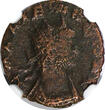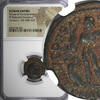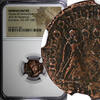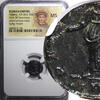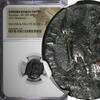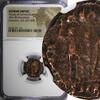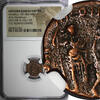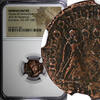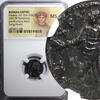MA-ID: 1707302018
Customer feedback Enumismatics Inc.
Belle monnaie,envoi rapide.
Nice coin, prompt shipment. Recommended.
A beautiful coin. Received quickly after ordering. Thank you!
Top seller ,, quick dispatch and communication,, fantastic item and packa...
Denarius 253 -268 AD ROMAN.Gallienus AD 253-268 BI Double- / Liberalitas NGC (147)
Enumismatics Inc. 

10
On MA-Shops since 10 years
1172 ratings,
99,6 % Positive (last 24 months)
Worldwide shipping
29.78 £40.00 US$
Import tax may be added
+ 11.17 £ shipping ( to United Kingdom )
Delivery time: 7 - 10 days
+ 11.17 £ shipping ( to United Kingdom )
| Customer Support +49 (0)2871 2180 383 |
| Payment methods |
| Wire Transfer |
| Check/Money Order |
 Certification details
Certification details
800315
ROMAN AGE OF CHAOS
Gallienus, AD 253-268 ROMAN EMPIRE
BI Double-Denarius
ROMAN EMPIRE
Gallienus, AD 253-268
GALLIENUS 253-268 AD
BI DOUBLE DENARIUS
Roman Age of Chaos
CERTIFIED BY NGC
Obverse:
Gallienus facing right, wearing a military style drape and a radiate
crown, framed by the inscription ''GALLIENVS AVG,'' which simply means ''Emperor
Gallienus.''
Reverse : LIBERALITAS AVG, Liberalitas standing left,
holding coin counter and cornucopiae
LIBERALITAS - Liberality, being one of the princely virtues
and at the same time a most popular quality, appears both as a legend and as a
type on a great many Roman imperial medals. These attest the occasions when the
emperors made a display of their generosity towards the people by all kinds of
distributions amongst them, in money and provisions. In the earlier age this was
called Congiarium (Munus), because they distributed congios oleo plenos. In the
time of the free republic, the Ediles were specially entrusted with these
distributions, as a means of acquiring the good will of the people. The same
practice was followed under the emperors; and we occasionally find on their
coins the word CONGIARIVM, but the more common term is LIBERALITAS, to which is
frequently added the number of times that such liberality has been exercised by
each emperor.
On these occasions of imperial munificence, a certain sum of money was for
the most part given to each person, and when grain was distributed, or bread, to
prevent the evils of dearness and famine from affecting the Roman populace, it
was called Annona. But when something beyond their ordinary pay was bestowed
upon the soldiers, it was denominated Donativum, a word, however, not found on
coins, but comprised under that of Liberalitas, or of Congiarium; and after the
reign of Marcus Aurelius, CONGIARIVM is no longer found, and the expression
LIBERALITAS is alone employed.
Liberality is personified by the image of a woman, holding in one hand a
counting board, or square tablet with a handle on which are cut a certain number
of holes. These boards were used to quickly count the proper number of coins or
other items for distribution to each person. It appears they would be dipped
into a container, covered with coins and the excess swept away back into the
container. The proper number of coins would fill the holes and then would be
dumped out to the recipient. On coins this symbol indicated the prince had given
to the people money, corn, and other articles of consumption. In the other hand
she holds a cornucopia, to indicate the abundance of wheat contained in the
public granaries. Liberalitas is represented as presiding at all congiaria. The
liberalities of the Augusti, by which the distribution of their bounties to the
people is signified, were of two kinds, ordinary and extraordinary.
Gallienus was Emperor of the Roman Empire
from AD 253-268, sharing the throne with his father Valerian until AD 260, then
as sole ruler until his death in AD 268. Based upon the inscriptions, this
Billon Double-Denarius of Gallienus was struck during his solitary reign, AD
260-268. The Romans typically used doubled letters to indicate plurality.
Coinage of Gallienus minted during his joint reign are inscribed ''AVGG'' (two
emperors), while later coins bear the inscription ''AVG.''
Publius Licinius Egnatius Gallienus ( c. 218
– September 268) was Roman emperor with his father Valerian from 253 to 260 and
alone from 260 to 268. He ruled during the Crisis of the Third Century that
nearly caused the collapse of the empire. He won a number of military victories
against usurpers and Germanic tribes, but was unable to prevent the secession of
important provinces. His 15-year reign was the longest in half a century.
Born into a wealthy and traditional senatorial family, Gallienus was the son of
Valerian and Mariniana. Valerian became Emperor in September 253 and had the
Roman senate elevate Gallienus to the ranks of Caesar and Augustus. Valerian
divided the empire between him and his son, with Valerian ruling the east and
his son the west. Gallienus defeated the usurper Ingenuus in 258 and destroyed
an Alemanni army at Mediolanum in 259.
The defeat and capture of Valerian at Edessa in 260 by the Sasanian Empire threw
the Roman Empire into the chaos of civil war. Control of the whole empire passed
to Gallienus. He defeated the eastern usurpers Macrianus Major and Lucius
Mussius Aemilianus in 261–262 but failed to stop the formation of the breakaway
Gallic Empire under general umus. Aureolus, another usurper, proclaimed
himself emperor in Mediolanum in 268 but was defeated outside the city by
Gallienus and besieged inside. While the siege was ongoing, Gallienus was
assassinated, stabbed to death by the officer Cecropius, as part of a
conspiracy.
Please check out my other listings and we will be happy to combine in one package !
YOU WILL RECEIVED THE SAME COIN AS PICTURED.
Info / FAQ
| Shipping fees | |||||
|---|---|---|---|---|---|
|
up to 74.45 £ and up to 453 g
|
74.46 £ to 148.92 £ and up to 453 g
|
148.92 £ to 372.30 £ and up to 453 g
|
up to 372.30 £ and 454 to 1814 g
| over 372.31 £ | |
| Germany | 11.17 £ | 11.17 £ | 11.17 £ | 14.89 £ | Free shipping |
| United States | 3.72 £ | Free shipping | Free shipping | Free shipping | Free shipping |
| European Union | 11.17 £ | 11.17 £ | 11.17 £ | 14.89 £ | Free shipping |
| World | 11.17 £ | 11.17 £ | 11.17 £ | 18.62 £ | Free shipping |
Information
Online orders are welcome as always and will be shipped directly.
|
Seller Home | 0Shopping cart | Terms of sale | Contact | MA Terms of sale | Privacy policy | Warranty | MA-Shops New Items Copyright ® 2001-2025, MA-SHOPS Coins All Rights Reserved. Designated trademarks and brands are the property of their respective owners. |
 Buy coins with warranty
Buy coins with warranty






